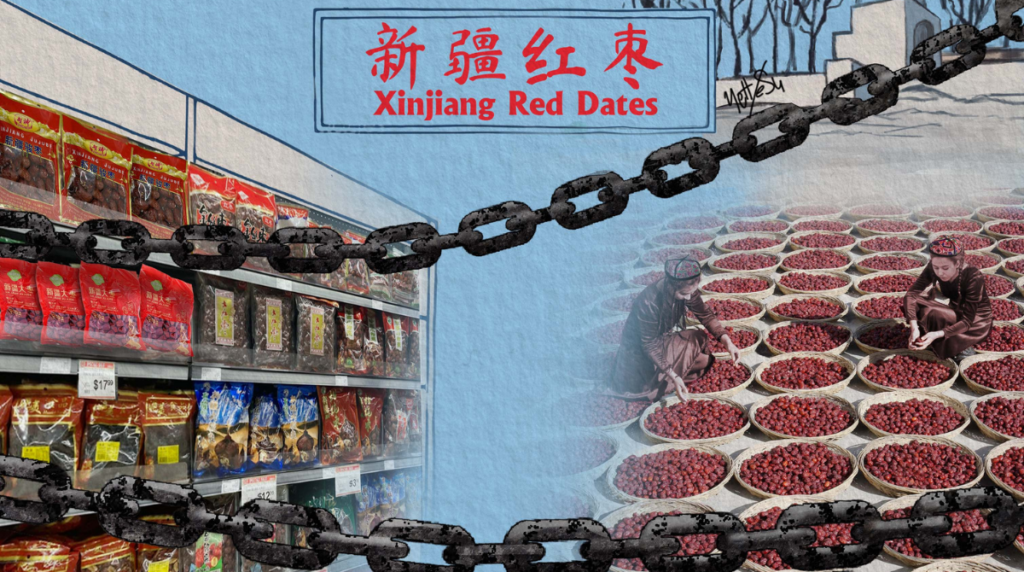New UHRP Research Finds American Grocery Stores Selling Sanctioned Forced Labor Products

August 28, 2022 | 7:00 p.m. EDT
For Immediate Release
Contact: Omer Kanat +1 (202) 819-0598, Peter Irwin +1 (646) 906-7722
New research by the Uyghur Human Rights Project (UHRP) has found that more than 70 brands of dried fruit products tainted by Uyghur forced labor are being sold to U.S. consumers, including on the shelves of at least seven Asian markets in the Washington, DC area.
The report, Fruits of Uyghur Forced Labor: Sanctioned Red Date Products on American Grocery Store Shelves, finds that 20 percent of red dates in the global supply chain are likely tainted by Uyghur forced labor. At least three brands specifically label their packages as “Bingtuan” products, indicating that they are produced by the U.S.-sanctioned Xinjiang Production and Construction Corps (XPCC). Since July 2020, all financial transactions with the XPCC have been prohibited under Global Magnitsky human rights sanctions.
“It’s shocking that forced labor goods are still making their way into U.S. stores. This makes ordinary consumers complicit in gross human rights violations,” said Nuzigum Setiwaldi, who researched and wrote the report.
“We need to see penalties for violations of the Global Magnitsky sanctions on the Xinjiang Production and Production Corps (XPCC). We need rigorous implementation of the Uyghur Forced Labor Prevention Act, and penalties for evading import restrictions,” said Omer Kanat, UHRP Executive Director. “The perpetrators and profiteers of the Uyghur genocide cannot be allowed to continue selling their products to American consumers.”
In 2019, red dates accounted for 80% of fruit intercropped with cotton in the Uyghur Region. Because cotton production is well documented as being at high risk of forced labor practices, fruit and fruit products, including red dates, should be considered at the same risk for forced labor as cotton.
Using global and U.S. trade data from multiple sources, including UN ComTrade, Import Yeti, and Seamless Horizon, UHRP traced red date products in global supply chains back to the Uyghur Region. UHRP also reviewed Chinese government reports, including the National Bureau of Statistics, China Statistical Yearbook, Xinjiang Statistical Yearbook, and Xinjiang Production and Construction Corps Statistical Yearbook, in addition to records on Weixin (WeChat).
Researchers contacted the grocery stores, distributors, and brands listed in the report with publicly available contact information. A few of these actors confirmed receipt of our correspondence but did not respond directly to our findings.
As of June 21, 2022, imports of products from East Turkistan are targeted for priority enforcement of the U.S. ban on forced-labor goods, under the Uyghur Forced Labor Prevention Act (UFLPA).
UHRP calls on the U.S. government to:
- Impose civil and criminal penalties for violations of Global Magnitsky sanctions currently in place, prohibiting all financial transactions with the XPCC and its subsidiaries
- Add brands selling red dates products sourced from the Uyghur Region to the UFLPA forced labor Entity List
- Add fruit and fruit products to the high-risk category of the UFLPA Enforcement Strategy
In the report, UHRP includes a consumer guide, “How to Identify Uyghur Red Date Products” and recommends U.S. companies map out their supply chain at every stage of production, from raw to finished product, to ensure their products are not sourced from the Uyghur Region. All U.S. brands and retailers should source red date products from alternative suppliers without any links to the Uyghur Region.
